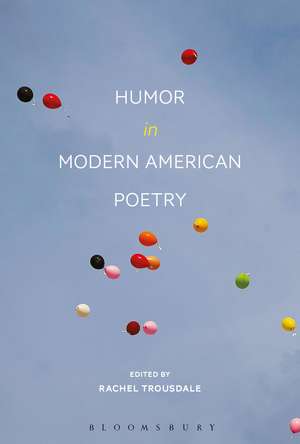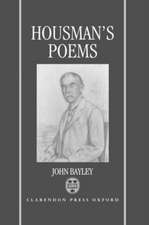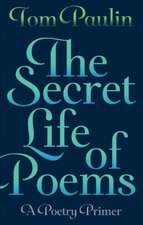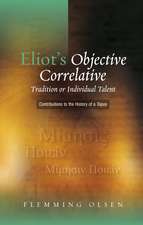Humor in Modern American Poetry
Editat de Prof Rachel Trousdaleen Limba Engleză Hardback – 15 noi 2017
| Toate formatele și edițiile | Preț | Express |
|---|---|---|
| Paperback (1) | 230.43 lei 6-8 săpt. | +84.29 lei 7-13 zile |
| Bloomsbury Publishing – 29 mai 2019 | 230.43 lei 6-8 săpt. | +84.29 lei 7-13 zile |
| Hardback (1) | 656.32 lei 6-8 săpt. | |
| Bloomsbury Publishing – 15 noi 2017 | 656.32 lei 6-8 săpt. |
Preț: 656.32 lei
Preț vechi: 943.02 lei
-30% Nou
Puncte Express: 984
Preț estimativ în valută:
125.58€ • 131.47$ • 103.91£
125.58€ • 131.47$ • 103.91£
Carte tipărită la comandă
Livrare economică 05-19 aprilie
Preluare comenzi: 021 569.72.76
Specificații
ISBN-13: 9781501334733
ISBN-10: 1501334735
Pagini: 240
Dimensiuni: 152 x 229 mm
Greutate: 0.49 kg
Editura: Bloomsbury Publishing
Colecția Bloomsbury Academic
Locul publicării:New York, United States
ISBN-10: 1501334735
Pagini: 240
Dimensiuni: 152 x 229 mm
Greutate: 0.49 kg
Editura: Bloomsbury Publishing
Colecția Bloomsbury Academic
Locul publicării:New York, United States
Caracteristici
Far from being a tool to provide 'comic relief', humor is shown to be significant in conveying ideas central to modernism
Notă biografică
Rachel Trousdale is Assistant Professor of English at Framingham State University, USA. She is the author of Nabokov, Rushdie, and the Transnational Imagination: Novels of Exile and Alternate Worlds (2010).
Cuprins
Notes on ContributorsAcknowledgmentsIntroduction: Theories of Humor and Modern PoetryRachel Trousdale (Framingham State University, USA) 1. Humor and Authority in Pound's CantosJoel Elliot Slotkin (Towson University, USA)2. Cummings' Erotic HumorWilliam Solomon (SUNY Buffalo, USA)3. Emotional Comedies: Lorine Niedecker's "For Paul" Marta Figlerowicz (Yale University, USA) 4. Laughing in the Gallery: Melvin Tolson's Refusal to HushLena Hill (University of Iowa, USA)5. Poetry and Good Humour: Marianne Moore and Elizabeth BishopHugh Haughton (University of York, UK)6. Convention and Mysticism: Dickinson, Hardy, WilliamsAlan Shapiro (University of North Carolina-Chapel Hill, USA) 7. Phyllis McGinley: Defending Housewifery with a LaughMegan Leroy (Independent Scholar, USA) 8. Tell Me the Truth: Humor, Love, and Community in Auden's Late-Thirties PoetryRachel Trousdale (Framingham State University, USA) 9. Merrill, Comedy, ConversationStephen Burt (Harvard University, USA) 10. "This Comic Version of Myself": Humor and Autobiography in John Ashbery's Poetry and ProseKarin Roffman (West Point, USA) BibliographyIndex
Recenzii
The eloquent and meticulously researched contributions are not only a joy to read but also expand our understanding of humor, ranging from sly reversals of convention to biting social satire and from assertions of superiority to joyful wordplay.
The essays focus on the different ways humor can connect, alienate, push boundaries, or demonstrate how a writer approaches a particular audience.
Humor in Modern American Poetry offers ample demonstration of what a conversation about humor can do . the collection's multiplicity of voices itself acts as evidence for the book's emphasis on humor as interpersonal . The volume . lays out an extremely readable account of how humor has been explained over the centuries, up through recent critiques by feminist theorists of comedy like Hélène Cixous and Regina Barreca. It would be an excellent overview for students new to studying humor and especially for those seeking a model of how to bring philosophy and literary studies together . In addition to putting forward a wealth of perceptions and points of departure, the writers of these essays are also often quietly funny in their own prose. Trousdale's winningly straightforward prose itself has a sense of humor around its edges, as does Solomon's quip about 'comic metaphors' as 'epistemologically irresponsible' (39) or Hill's pointing out the élan in mélange (94). And as is apt for a book about dialogue and other voices, there is the sheer array of good quotations . Such references are pleasures in and of themselves, but they also attest to the energy of this book: in its breadth and imagination, Humor in Modern American Poetry helps span the gap between poetry and humor studies.
The essays in this collection not only demonstrate how unexpectedly funny modern and contemporary American poetry can be, but persuasively show how humor is integral to the aesthetics and ethics of much 20th-century verse. Bolstered by consistently fine close readings, these essays invite one to rethink the priorities of key figures from Pound and Moore to Ashbery and Merrill, and refocus our attention on some writers, like Phyllis McGinley, who have largely been forgotten. In Rachel Trousdale's cogent and wide-ranging introduction, and in the best of these pieces, this collection begins to challenge some of our basic premises about how comedy itself works. A useful and provocative book.
It is often said that the last sense we lose is our sense of humor. We certainly laugh before we speak. While theories of laughter date back to Plato, no one theory can account for its importance to us and our repeated failure to treat it seriously. This collection of essays makes a giant leap in the right direction. It analyses humor not as a side effect from the so-called main business of modernist poetics, but as one of modern poetry's most significant concerns. Importantly, it suggests that humor has an ethical and political dimension, encouraging modern poets (and readers of modern poetry) to escape, ridicule and reject what Rachel Trousdale in the introduction rightly calls 'the humorless, realist pressure to arrive at a single answer to complex questions.'
The ten essays cover a lot of ground . In each case, the humor of the poetics challenges the philosophical and psychological assumptions about humor. The poetics of humor connects the individual, the interpersonal, and the collective, and serves as the basis of shared values, insight, and originality. The arrangement of the essays allows the reader to revisit a larger discussion of modern American poetry and its scope and range. The collection is also timely as it exposes the need for both humor and poetry in these humorless times. Summing Up: Recommended.
The essays focus on the different ways humor can connect, alienate, push boundaries, or demonstrate how a writer approaches a particular audience.
Humor in Modern American Poetry offers ample demonstration of what a conversation about humor can do . the collection's multiplicity of voices itself acts as evidence for the book's emphasis on humor as interpersonal . The volume . lays out an extremely readable account of how humor has been explained over the centuries, up through recent critiques by feminist theorists of comedy like Hélène Cixous and Regina Barreca. It would be an excellent overview for students new to studying humor and especially for those seeking a model of how to bring philosophy and literary studies together . In addition to putting forward a wealth of perceptions and points of departure, the writers of these essays are also often quietly funny in their own prose. Trousdale's winningly straightforward prose itself has a sense of humor around its edges, as does Solomon's quip about 'comic metaphors' as 'epistemologically irresponsible' (39) or Hill's pointing out the élan in mélange (94). And as is apt for a book about dialogue and other voices, there is the sheer array of good quotations . Such references are pleasures in and of themselves, but they also attest to the energy of this book: in its breadth and imagination, Humor in Modern American Poetry helps span the gap between poetry and humor studies.
The essays in this collection not only demonstrate how unexpectedly funny modern and contemporary American poetry can be, but persuasively show how humor is integral to the aesthetics and ethics of much 20th-century verse. Bolstered by consistently fine close readings, these essays invite one to rethink the priorities of key figures from Pound and Moore to Ashbery and Merrill, and refocus our attention on some writers, like Phyllis McGinley, who have largely been forgotten. In Rachel Trousdale's cogent and wide-ranging introduction, and in the best of these pieces, this collection begins to challenge some of our basic premises about how comedy itself works. A useful and provocative book.
It is often said that the last sense we lose is our sense of humor. We certainly laugh before we speak. While theories of laughter date back to Plato, no one theory can account for its importance to us and our repeated failure to treat it seriously. This collection of essays makes a giant leap in the right direction. It analyses humor not as a side effect from the so-called main business of modernist poetics, but as one of modern poetry's most significant concerns. Importantly, it suggests that humor has an ethical and political dimension, encouraging modern poets (and readers of modern poetry) to escape, ridicule and reject what Rachel Trousdale in the introduction rightly calls 'the humorless, realist pressure to arrive at a single answer to complex questions.'
The ten essays cover a lot of ground . In each case, the humor of the poetics challenges the philosophical and psychological assumptions about humor. The poetics of humor connects the individual, the interpersonal, and the collective, and serves as the basis of shared values, insight, and originality. The arrangement of the essays allows the reader to revisit a larger discussion of modern American poetry and its scope and range. The collection is also timely as it exposes the need for both humor and poetry in these humorless times. Summing Up: Recommended.










